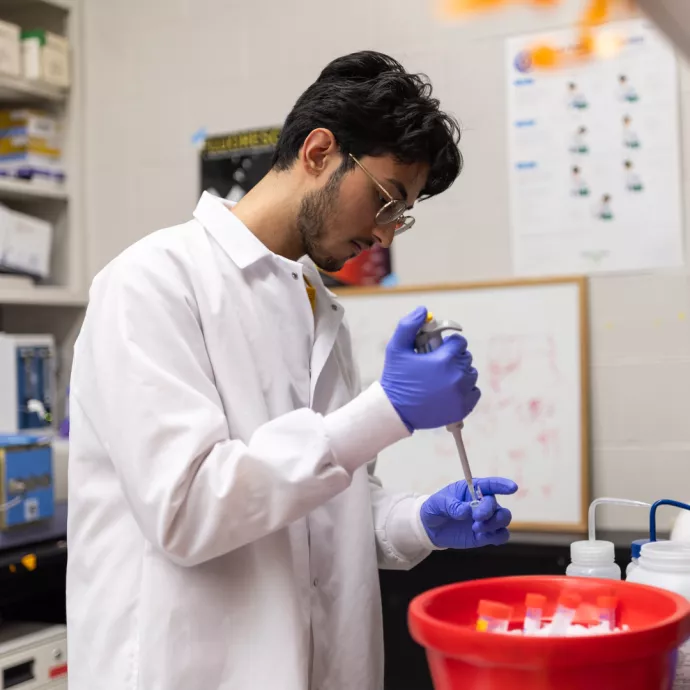Summer Start Up: INSPIRE Scholars Program Offers Unique Interdisciplinary Experience

Earlier this summer, top science students came to campus for the 2023 Interdisciplinary Summer Program in Research and Entrepreneurship (INSPIRE). The competitive two-week program is now in its second year, offering undergrads eyeing graduate school an opportunity to learn about the various career paths available to them in the life sciences.
Changes from last year’s inaugural program included a dynamic roster of entrepreneurial and academic guest speakers complemented by dedicated hands-on time in the labs of UTM’s faculty researchers.
The theme for 2023 was “21st Century Biophysical Techniques.” The program was organized by Josh Milstein, an Associate Professor in the Department of Chemical and Physical Sciences (CPS) and the Department of Physics, and Daniel Nino, a former Physics graduate student in CPS. Six immersive modules were developed and delivered by graduate students working in research labs across CPS; each student selected three.



The trainees worked on everything from Nuclear Magnetic Resonance experiments in the NMR Core Facility to learning about single molecule spectroscopy in the Gradinaru Lab. And, at the end of the two weeks, students presented their work in front of their peers at a small mock ‘conference.’
“I had students in my lab performing advanced measurements on our cutting-edge microscopes—and they were up to the challenge!” says physics professor Claudiu Gradinaru, who served as faculty instructor and hosted two of the guest speaker lectures. “I thoroughly enjoyed being part of the program and am fully committed to contributing to INSPIRE again in the future.”
For Milstein, one of the key parts of the experience is the interdisciplinarity embedded in the program. Students coming from across the physical sciences work together on various experiments, often out of their comfort zones and dependent on the knowledge and skills of their fellow students—some of whom may be pursuing different degrees.
“I think training initiatives like this build skillsets that are highly valued by companies. Generally, students will go off and work in industry—and that’s the sort of environment you’re in if you're at a company,” Milstein explains. “If you work in, say, a lab that conducts interdisciplinary research, the people around you may not have the same skillset as you. And that’s for a reason.”


Also at its core, INSPIRE helps students to imagine a future career in entrepreneurship.
“Students are often sold a traditional path, that they should go to graduate school and become a professor. But with so few faculty positions available, that path is hardly ever followed,” Milstein points out. “They need reasons to go to grad school. We’re trying to give them more realistic career paths.”
“And it’s good for us, too,” he adds. “If we don’t give them good reasons, we’re going to have a much smaller pool in future.”
With this in mind, the team arranged for various entrepreneurs, academics, and start-up founders from across the GTA biotech ecosphere to join the group as guest speakers. They spoke on a range of topics, offering valuable perspectives on everything from intellectual property to translating research discoveries into a marketable product to what it’s like trying to raise capital.
“It was a treat to be with an engaged group of young researchers who asked insightful questions,” reflects guest speaker Ruby Sullan, an assistant professor in UTSC’s Department of Physical & Environmental Sciences and the Department of Chemistry at the downtown campus. Sullan spoke to the students on atomic force microscopy.
“INSPIRE is an excellent venue for students to be exposed to state-of-the-art modern biophysics along with careers in industry that the broader field applies to,” she says. “And it provides them with a playground to delve deeper into exciting experiments.”
Milstein remarks on how impressed he was by the caliber of this year’s students. He wants to help more undergrads to see what’s available to them in the physical and life sciences and looks forward to seeing how INSPIRE can grow.

As for next year? Milstein plans to incorporate SpinUp into the program offerings. Housed in UTM’s New Science Building, SpinUp will launch this fall as U of T’s first wet lab incubator that will host early-stage life science startups. Milstein hopes INSPIRE students will be able to shadow a founder for a few days as part of the program.
“A lot of times it’s a graduate student who’s translating an idea that they have or something they worked on during grad school, and now they’re trying to turn it into a startup,” he says. “So, students will get to see what that looks like up close. I think it could be a really useful experience for them.”
“We have a good core structure now with lots of student and faculty interest,” Milstein says. “We can continue to build on that.”



